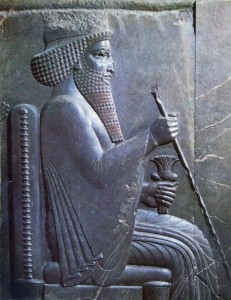 “Write This Down…” provides a restatement of selected points or observations from various teaching venues at which Pastor Matthew speaks. The following material is from Pastor Matthew’s sermon entitled, “One Man Can Make a Difference”, part of the sermon series “Memoirs of an Ancient Prophet: A Study of the Book of Daniel,” presented the weekend of January 2, 2011, at Bethel Church:
“Write This Down…” provides a restatement of selected points or observations from various teaching venues at which Pastor Matthew speaks. The following material is from Pastor Matthew’s sermon entitled, “One Man Can Make a Difference”, part of the sermon series “Memoirs of an Ancient Prophet: A Study of the Book of Daniel,” presented the weekend of January 2, 2011, at Bethel Church:
The year 605 BC was a pivotal year in world history, for it was at this time that the Babylonian Empire secured itself as the world’s superpower, having defeated the Egyptians and their king, Neco II, in the Battle of Carchemish. The man who lead the Babylonian victory was Nebuchadnezzar, the son of the Babylonian king Nabopolassar. Ironically, shortly after the Battle of Carchemish, Nabopolassar died, leaving Nebuchadnezzar as the new king of the new superpower.
To shore up his empire Nebuchadnezzar set his eyes on the tiny and weak Kingdom of Judah, squeezed ever-so precariously between Babylon and Egypt. Generations of idolatry and political intrigue had left Judah in decline, and this situation was not helped by its monarch at the time, a man named Jehoiachim. In the late summer to early fall of 605 BC, Nebuchadnezzar besieged Jerusalem and had Jehoiachim brought before him in chains, along with the bulk of the noble families. When brought before him Nebuchadnezzar had Jehoiachim pay him homage, had many of the noble families executed, and took from among the nobility the brightest and best of their sons to be slaves within his own royal court. Jehoiachim was returned to Jerusalem to govern as a vassal king. A young man named Daniel, of noble birth, and his peers, were emasculated and then escorted back to Babylon to ultimately serve Nebuchadnezzar.
 This new normal for Daniel and his friends was a terrifying and brutal existence. Nebuchadnezzar was determined to eradicate Daniel’s Jewish heritage, seeking to make him and his friends into the ideal Babylonian servants. Part of this exercise meant the changing of their Hebrew names into Babylonian names. Hananiah, whose Hebrew name meant “YHWH has been gracious,” was given the Babylonian name Shadrach, which meant “I am afraid.” Mishael, whose Hebrew name meant “Who is what God is?”, was given the Babylonian name Meshach, which meant “I am despised.” Azariah, whose Hebrew name meant “YHWH has helped,” was given the Babylonian name Abednego, which means “servant of the god Nebo.” And Daniel, whose Hebrew name meant “God is my judge,” was given the Babylonian name Belteshazzar, which means “Lady, protect the king!” Clearly, it was Nebuchadnezzar’s desire that these men understand their place.
This new normal for Daniel and his friends was a terrifying and brutal existence. Nebuchadnezzar was determined to eradicate Daniel’s Jewish heritage, seeking to make him and his friends into the ideal Babylonian servants. Part of this exercise meant the changing of their Hebrew names into Babylonian names. Hananiah, whose Hebrew name meant “YHWH has been gracious,” was given the Babylonian name Shadrach, which meant “I am afraid.” Mishael, whose Hebrew name meant “Who is what God is?”, was given the Babylonian name Meshach, which meant “I am despised.” Azariah, whose Hebrew name meant “YHWH has helped,” was given the Babylonian name Abednego, which means “servant of the god Nebo.” And Daniel, whose Hebrew name meant “God is my judge,” was given the Babylonian name Belteshazzar, which means “Lady, protect the king!” Clearly, it was Nebuchadnezzar’s desire that these men understand their place.
In this world Daniel and his friends had the choice to acquiesce to Babylonian normalcy and by so doing leave the God of their fathers, or choose to stand firm and retain their heart-faith even in the midst of the pressure. They chose the latter, resolving (Daniel 1:8) to not be defiled by the Babylonian way of life. This resolve allowed them to enjoy God’s favor in the midst of the awful world in which they lived, it motivated them to stand firm in the face of death, serve as examples to their people, and provide a holy kind of influence among the Babylonians—even the kings. But it also was costly. They were often isolated and oppressed by the people around them, and Daniel, for one, had to deal regularly with the intense burden which was God’s revelation to him of things to come; a blessing to be sure, but also a heavy load.
Daniel’s commitment to have resolve is a model for you and me, inspiring us to join him in righteousness and model such to those around us. We too live in a world gone awry. Darkness and death dominate the landscape of our day, and the pressures to conform to ungodliness are overwhelming. But by recognizing that our souls find rest no where else but with God (cp. Psalm 62:1), we can find strength to live and finish well. After all, God is the one who has told us that he will honor those who honor him (1 Samuel 2:30). His was an act of the will, forged on the anvil of total loss and utter dependency upon God, solidified with the accountability of trusted companions, knowing it could cost him his life.
Watch Pastor Matthew’s sermon entitled “One Man Can Make a Difference”


hello
my name is karen i studying the book of daniel and i have a question were did you get the information on becuase i Have been looking for it that Belteshazzar in translation means
Lady, protect the KIng
i find it very interesting
Hi Brad . . .
Thanks so much . . . I really appreciate your encouragement!
Regarding citations, I completely get where you’re coming from in that regard, and have always desired more from others, and myself, when preaching brings those issues to the surface. Admittedly, I think about the matter of sourcing things nearly every week; worry about it at times. The primary challenge I have is time and then getting bogged down in too much minutiae, albeit important. Years ago I went out of my way to cite a lot of different things; but because of the time and detail factor I’ve done less of that while remaining more than willing to share those things with anyone that asks.
All that is to say I totally value your concern and am very thankful for your questions. And, again, am grateful you guys are here and well. I love you and your family so much, and am thankful to the King for you guys!
Matthew
Hello Pastor Matthew,
Thank you for your welcome, support and prayers – and be assured that I regularly pray for you also. Thank you for your gracious and detailed response to my comments above, and for explaining your perspective. It has been a good exercise for me to ‘search the scriptures’ to gain a better understanding of Daniel in this process. I appreciate your desire to synthesize and present information from different sources and your own scholarship – background information on a passage is certainly valuable. What I am leery of is when significant additions are made to a Biblical story line itself, without mentioning, at the time, where the additional information is coming from – whether other verses or extra-Biblical sources, or if there are notable, opposing interpretations – particularly when it comes to such things as the topic you are heading into – eschatology! Thank you for being willing to teach controversial topics.
The last time I was in the US you were finishing a series on the “Seven Deadly Sins”, and encouraging us to write down sins we were dealing with and “leave it in the chair”, as we left the service. Thank you for those admonitions, I left some behind, and am trying to continue to do so! I appreciated the definitions of the sins that you presented.
Brad
Hi Brad . . .
I’m really glad you’re back in ND, and I know your family is. About the sermon, thanks for your inquiry. Let me take each item one at a time.
You are right, of course, that the deaths of the nobles are not mentioned in Daniel 1. However, the deaths of nobles reflected a practice whereby the Babylonians could control and weaken the conquered royal house. We see this in Jeremiah 39, for instance, when King Zedekiah’s sons are slaughtered by Nebuchnezzar’s lieutenants, though, admittedly, this takes place a few years after Daniel is taken as a slave. The fact that Daniel comes from noble stock, and that there is no mention at all of his family, suggests that they were likely killed.
The castrations were also common. The word used to describe a eunuch is a word that commonly references castration, though it can also suggest “court official” in a seemingly vague sense. The context of Isaiah 39:7, which prophesies about the deportations to Babylon, uses language that is more in keeping with castration of the nobles. Some suggest Daniel might not have been a eunuch because he was to have no physical blemishes before the king. However, Babylonian custom suggests there were many others within the court who had been castrated, so it’s inconclusive at best to perceive Daniel as being exceptional. No blemishes, as Daniel 1:4 says, but castration would not necessarily be “seen” by the king. Overall custom and passages like Isaiah 39:7 lead me to land with a number of biblical scholars that he was likely castrated; though there are excellent scholars unwilling to go that far.
It is true that the NIV and many other sources, particularly older ones, suggest something like “Bel, protect the king” for Daniel’s Babylonian name. However, over recent years many scholars, with refinements in Akkadian studies, are recommending “Lady, protect the king,” in reference to the consort of Bel, believing that Belteshazzar is a shortened form of the Akkadian word Bēlet-šar-uşur. Dwight Pentecost, the excellent ESV Study Bible, J. G. Baldwin, Tremper Longman III, and many other scholars recommend this today. The general consensus among most scholars that I’ve read—in fact, every commentary on Daniel that I have—is that the purpose of the names was to eradicate from Daniel and his friends their Judaism and force them into the context of Babylonian idolatry. “Thus the chief court official (Ashpenaz, v. 3) seemed determined to obliterate any testimony to the God of Israel from the Babylonian court. The names he gave the four men signified that they were to be subject to Babylon’s gods” (Pentecost, BKC, 1330).
Regarding the trek to Babylon, The Jewish Encyclopedia tells of one of Nebuchadnezzar’s lieutenants escorting Daniel and the other Hebrew slaves across the desert: “On arriving [at the Euphrates] he said to his troops: ‘Let them rest here, for from this time forward their God will not care for them.’ Therefore it is said, ‘By the rivers of Babylon we sat’ (Ps. cxxxvii. 1), only then, not before (Lam. R. v. 5). By the rivers of Babylon they sat and wept over the dead who had fallen by the sword of Nebuchadnezzar and by the waters of the Euphrates, which had proved fatal to those used to the rain-water and the spring-water of Palestine. But the tyrant sat in a ship, surrounded by all his nobles in the midst of all kinds of music (Isa. xliii. 14), while on the bank passed the princes of Judah naked and in iron chains. ‘Why do these people go without burdens on their shoulders?’ he asked as he caught sight of them. Then heavy burdens were put upon them.” There are other sources, too, but this is one I have available in front of me at the moment.
There is no doubt that the royal official showed interest in Daniel. The Hebrew words used to describe his favor toward Daniel are chesed, which means “loyal love” and rahamim, which means “compassion.” Interestingly, Daniel 1:9 says that “God gave” Daniel these things from the royal official. With Daniel 2 portraying the Babylonian officials as potentially being torn limb to limb and killed because they might not interpret a dream, and then with the later matters of fiery furnaces, not just for Daniel’s friends but also the enemies of these friends, it appears that the default reality for the Babylonian court is brutality and harshness where life is cheap and people learn to survive. I perceive that is why God, in his mercy, gave the official the favor toward Daniel and his friends that would allow them to fulfill their unique calling. If it hadn’t been a gift from God it would not have transpired as revealed in the text.
I will be the first to tell you that there is the risk of liberties being taken with the nature of the Babylonians and the reflections I offer on everything from the names to the castrations. Scholars are generally all over the map on many of these things. I work to understand the sentiments that are out there, absorb the historical and cultural accounts as they are presented ranging from people like Herodotus and Josephus to modern day historians and collections, process the text through my own language skills, and then seek to square these as much as reasonably possible with other scriptural passages. Please forgive when I fall short, for I am certain I too regularly shall.
In the meantime, please know I love you and your family and pray for you guys. It was really good to see you guys together this past weekend. I’m really glad your back.
Matthew
Dear Pastor Matthew,
Greetings from ND once again. I was looking forward to your series on Daniel, and appreciated the intro you gave last Sunday. However, I (and my children) have a few questions and comments about what you said after the intro, which I hope you don’t mind me asking.
I was surprised to hear about beheadings and castrations, and even an emphasis on them, which I don’t see mentioned at all in Daniel 1, though the Bible has no compunction against giving such details. Did you get this info from another, unstated, source?
I think that the Chief Eunuch was exceptionally kind in how he treated the elite youths he selected – a beautiful example of God’s power to bless through unexpected directions, even in times of trial. He wanted them to be won over, and in an understandable enough act of enculturation gave them names that referenced pagan Babylonians gods instead of YHWH. I hadn’t heard your take on the negative meanings of the names, so I checked their meanings in the NIV study Bible and online resources, both Christian and secular. Only one source mentioned any kind of negative connotation, all the rest just stated, or postulated, that the names were respectable.
Most noticeably, Daniel’s new name, by all sources I found, was the most honorable of all! In fact, “Belteshazzar” was virtually the same name as the later Babylonian king, “Belshazzar”. “Bel” was the highest Babylonian diety, and is mentioned several times in the OT in reference to Babylon. Belteshazzar is interpreted to mean various things from “Prince of Bel” to “Bel, protect the king!”. I think the Chief saw great potential in Daniel, and was wisely doing the best his pagan heart knew to elevate him. That being said, I certainly don’t think they were humiliated all the way to Babylon by getting led naked, that would be very poor human resource management.
In regards to Daniel’s resolve to be kept unstained by the king’s food, I think the resolve was not one of refusing to be crushed by insult, but one of refusing to be seduced by the luxuries offered him by a pagan culture trying to win him over – which is often the more difficult of the two, and has a direct parallel to how we are to live counter-culturally in our society today.
I know you are very busy, but any clarification on these issues from you would be appreciated.
Sincerely,
Brad Friesen